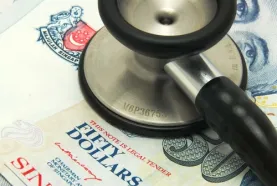Singapore
This is how tech startups are revolutionising Asian healthcare
An app provides personalised in-depth consultations with just one click. Patients are always taught never to look up their symptoms online, lest they run across medical websites that will blow their conditions out of proportion. But what if patients can speak with actual doctors through an app rather than looking up their symptoms themselves? With its proprietary doctor discovery search engine, healthtech startup DocDoc seeks to help patients find high quality specialised medical care for their unique needs. Healthcare Asia sat down with Cole Sirucek, CEO and Co-Founder, DocDo, to discover the latest developments in the region’s booming healthtech scene. 1. What is the status of Asia's Healthtech scene today in terms of funding? Who are the main movers? Today, Asia Pacific’s healthtech ecosystem is the second largest in the world, only behind the United States. In 2018 alone, the region’s industry raised a staggering US$6.3 billion in investments[1]. Within Asia, India, China and Singapore are emerging as key health technology hubs[2] as they hold a significant share of the ecosystem, with the majority of start-ups based in these countries and because they attract a significant portion of the investments. 2. What are the opportunities and challenges in the healthtech scene today faced by startups like DocDoc? Governments and companies across Asia are constantly looking for ways to innovate new solutions in order to address some of the region’s most pressing healthcare challenges including an ageing population, lack of access to relevant information, and increasing costs. For instance, Hong Kong has made a major push recently to promote itself as an InsurTech hub, with the formation of a new independent insurance authority (IIA) and having just issued its first online-only insurer under a "fast-track" system. Singapore also announced that it will invest an additional S$300 million to research and development (R&D) in technologies such as artificial intelligence (AI) and cybersecurity, as the nation continues to develop services to improve healthcare. At the same time, we are also seeing the rise of informed consumers – including in healthcare, where they seek the power to access the most up-to-date and relevant information at their fingertips, regardless of location, to help them make the right decisions. Throughout Asia, consumers in healthcare experience a dire lack of transparency and below average customer service. They waste hours trying to get a primary care consultation, in often cases, only to find out that they need to see a specialist. Then begins the daunting task of researching for the right specialist. Patients’ only choices are to rely on online doctor directories or referral from friends and family. Online doctor directories provide very little information on the background and expertise of the specialists, therefore making it remarkably challenging to distinguish between the numerous doctors under the same specialty, in the same region. Referral from friends and family are based on anecdotal evidence at best. Consumers are largely forced to choose a doctor in an information vacuum and left to face the draw of the luck. The lack of information not only causes enormous stress on patients but also leads to higher complication rates, re-admission rates, and higher costs. All these present a huge opportunity for health technology innovators. However, as key stakeholders come with widely varied interests and as businesses grow, the main challenge companies may face is losing sight of the patients’ best interests, so there needs to be a priority to keep them protected. To do this, healthcare providers and payers must move to a patient-centric model to ensure they address and meet the needs of the patients. 3. What is the role of startups in driving healthtech innovations? Across industries start-ups tend to be more agile than large corporations and hence tend to be quicker in bringing ground-breaking new technologies and business models to market. The healthtech industry is no different. To future-proof itself, the ecosystem needs to focus on how it can address and resolve healthcare gaps and challenges across markets, while striking a balance between the role of large corporations and start-ups. 4. How does DocDoc leverage on artificial intelligence (AI) to help patients? DocDoc is a virtual network of physicians and hospitals that helps patients find high quality specialised medical care for their unique needs, when they need it. With more than 23,000 doctors and 793 hospitals and clinics under contract, we have the largest doctor network in Asia, covering a variety of expertise. A key component to our offering is our doctor discovery search engine, HOPE (heuristic for outcome, price, and experience). Powered by artificial intelligence (AI), HOPE allows us to search our database of 23,000 doctors and compare them based on outcome, price, and experience at a procedure and condition level of granularity. In doing so, HOPE finds a best match between a patient's unique needs and a physician's expertise. DocDoc’s value proposition, powered by HOPE, is wholly unique in the industry. However, we realise that healthcare is personal and patients value human touch. Therefore, we combine our AI-powered doctor discovery engine with stellar customer service provided by medically trained doctor discovery consultants. When a patient contacts us, our doctor discovery consultants discuss the patient’s medical needs in detail and leverage HOPE to provide customised panels of recommended physicians. Each panel of recommended physicians is uniquely customised to suit the medical needs of the patient's condition or requested procedure. Moreover, patients are provided with a doctor discovery report which contains detailed information about the recommended physicians in a consumer-friendly and easily digestible manner. We have built and continue to build our database by spending hours with each doctor, investigating quality of care and documenting procedures and conditions where the physician excels. We also review national records to confirm credentials and discover any legal action. Our goal is to give patients access to powerful and credible information to help them find the right care at the right time, and we believe that this data will help empower them to do just that. 5. What's next for DocDoc? The healthcare industry in Asia Pacific is booming as patients demand for better customised services. We hope to bring our AI-powered doctor discovery platform to more patients across Asia to help them find the right doctor at the right time based on verified information. With our recent investment from Cyberport Macro Fund (CMF), we are one step closer to this as we will be looking to strengthen and grow our network of doctors in Hong Kong, while expanding our market presence. We will also be working with CMF to leverage the Cyberport facilities, infrastructure and its network to continue expanding our insurance footprint in Hong Kong, providing data-driven doctor discovery services to insurance policyholders.
This is how tech startups are revolutionising Asian healthcare
An app provides personalised in-depth consultations with just one click. Patients are always taught never to look up their symptoms online, lest they run across medical websites that will blow their conditions out of proportion. But what if patients can speak with actual doctors through an app rather than looking up their symptoms themselves? With its proprietary doctor discovery search engine, healthtech startup DocDoc seeks to help patients find high quality specialised medical care for their unique needs. Healthcare Asia sat down with Cole Sirucek, CEO and Co-Founder, DocDo, to discover the latest developments in the region’s booming healthtech scene. 1. What is the status of Asia's Healthtech scene today in terms of funding? Who are the main movers? Today, Asia Pacific’s healthtech ecosystem is the second largest in the world, only behind the United States. In 2018 alone, the region’s industry raised a staggering US$6.3 billion in investments[1]. Within Asia, India, China and Singapore are emerging as key health technology hubs[2] as they hold a significant share of the ecosystem, with the majority of start-ups based in these countries and because they attract a significant portion of the investments. 2. What are the opportunities and challenges in the healthtech scene today faced by startups like DocDoc? Governments and companies across Asia are constantly looking for ways to innovate new solutions in order to address some of the region’s most pressing healthcare challenges including an ageing population, lack of access to relevant information, and increasing costs. For instance, Hong Kong has made a major push recently to promote itself as an InsurTech hub, with the formation of a new independent insurance authority (IIA) and having just issued its first online-only insurer under a "fast-track" system. Singapore also announced that it will invest an additional S$300 million to research and development (R&D) in technologies such as artificial intelligence (AI) and cybersecurity, as the nation continues to develop services to improve healthcare. At the same time, we are also seeing the rise of informed consumers – including in healthcare, where they seek the power to access the most up-to-date and relevant information at their fingertips, regardless of location, to help them make the right decisions. Throughout Asia, consumers in healthcare experience a dire lack of transparency and below average customer service. They waste hours trying to get a primary care consultation, in often cases, only to find out that they need to see a specialist. Then begins the daunting task of researching for the right specialist. Patients’ only choices are to rely on online doctor directories or referral from friends and family. Online doctor directories provide very little information on the background and expertise of the specialists, therefore making it remarkably challenging to distinguish between the numerous doctors under the same specialty, in the same region. Referral from friends and family are based on anecdotal evidence at best. Consumers are largely forced to choose a doctor in an information vacuum and left to face the draw of the luck. The lack of information not only causes enormous stress on patients but also leads to higher complication rates, re-admission rates, and higher costs. All these present a huge opportunity for health technology innovators. However, as key stakeholders come with widely varied interests and as businesses grow, the main challenge companies may face is losing sight of the patients’ best interests, so there needs to be a priority to keep them protected. To do this, healthcare providers and payers must move to a patient-centric model to ensure they address and meet the needs of the patients. 3. What is the role of startups in driving healthtech innovations? Across industries start-ups tend to be more agile than large corporations and hence tend to be quicker in bringing ground-breaking new technologies and business models to market. The healthtech industry is no different. To future-proof itself, the ecosystem needs to focus on how it can address and resolve healthcare gaps and challenges across markets, while striking a balance between the role of large corporations and start-ups. 4. How does DocDoc leverage on artificial intelligence (AI) to help patients? DocDoc is a virtual network of physicians and hospitals that helps patients find high quality specialised medical care for their unique needs, when they need it. With more than 23,000 doctors and 793 hospitals and clinics under contract, we have the largest doctor network in Asia, covering a variety of expertise. A key component to our offering is our doctor discovery search engine, HOPE (heuristic for outcome, price, and experience). Powered by artificial intelligence (AI), HOPE allows us to search our database of 23,000 doctors and compare them based on outcome, price, and experience at a procedure and condition level of granularity. In doing so, HOPE finds a best match between a patient's unique needs and a physician's expertise. DocDoc’s value proposition, powered by HOPE, is wholly unique in the industry. However, we realise that healthcare is personal and patients value human touch. Therefore, we combine our AI-powered doctor discovery engine with stellar customer service provided by medically trained doctor discovery consultants. When a patient contacts us, our doctor discovery consultants discuss the patient’s medical needs in detail and leverage HOPE to provide customised panels of recommended physicians. Each panel of recommended physicians is uniquely customised to suit the medical needs of the patient's condition or requested procedure. Moreover, patients are provided with a doctor discovery report which contains detailed information about the recommended physicians in a consumer-friendly and easily digestible manner. We have built and continue to build our database by spending hours with each doctor, investigating quality of care and documenting procedures and conditions where the physician excels. We also review national records to confirm credentials and discover any legal action. Our goal is to give patients access to powerful and credible information to help them find the right care at the right time, and we believe that this data will help empower them to do just that. 5. What's next for DocDoc? The healthcare industry in Asia Pacific is booming as patients demand for better customised services. We hope to bring our AI-powered doctor discovery platform to more patients across Asia to help them find the right doctor at the right time based on verified information. With our recent investment from Cyberport Macro Fund (CMF), we are one step closer to this as we will be looking to strengthen and grow our network of doctors in Hong Kong, while expanding our market presence. We will also be working with CMF to leverage the Cyberport facilities, infrastructure and its network to continue expanding our insurance footprint in Hong Kong, providing data-driven doctor discovery services to insurance policyholders.
Bumrungrad's net profit up 5% to US$30m in Q42018 amidst medical tourism boom
Middle Eastern arrivals are back on track.
Nominations open for SBR Listed Companies Awards 2019
The search is on for the best listed companies in Singapore.
Raffles Medical's profit rises 0.4% to $71m in FY 2018
This was supported by the 6% revenue growth of the Healthcare Services division.
NCS IT miscalculates healthcare subsidies of 7,700 Singaporeans
1300 CHAS members received lower subsidies due to the error.
Singapore Budget centres on senior population with a $6.1b fund
Beneficiaries will receive an annual medicine top-up of S$200 for the next five years.
Singapore Budget 2019 – Making healthcare more affordable and accessible
Singapore remains a leader in making healthcare more accessible for its growing pioneer generation. The focus now is likely to shift towards taking the digital route to making healthcare more affordable and accessible.
Singapore scientists further unravel ALS mystery in groundbreaking new work
It will drive future work to significantly slow down the disease.
Singapore rolls out accelerated course for allied health professionals
It targets mid-career professionals.
Patients at risk as APAC healthcare providers face cyber-attacks
Firms lose over $23.3m to cybercriminals.
Protected data sharing and Life Sciences in the Asia Pacific: From treatment to prevention
In the last decade, “big data” and “data & analytics” dominated the life sciences sector, and with increasing digitisation and liberation of data, the sharing of medical information will take center stage going forward. But it comes with great responsibility, particularly from a security and privacy perspective because health data is highly valued, especialty by hackers.
Consumerisation of genetic testing: Perspectives from Asia
Rapid technological advancement in recent years has placed affordable genetic testing in the hands of consumers and the global direct-to-consumer genetic testing (DTC-GT) market is forecast to be worth over US$1bn by 2020.
Unlocking health and care value: Diagnostics Industry in the Asia-Pacific
Diagnostics play a vital role in spotting health problems and informing medical interventions. However, despite rising demand in most of the world’s largest healthcare economies, many diagnostics companies struggle against commoditization as governments face increasing pressure to move from volume to value-based contracting and to encourage more preventive, healthy behaviors of the population. These very same pressures also present opportunities as diagnostics companies can be the central link between healthcare products and services.
Universal healthcare adoption in Asia: Are Life Sciences companies late to the game?
The United Nations (UN) has set a goal to achieve “Health for All” by 2030 and while 193 countries have signed up to it, more than one billion people still lack access to basic healthcare. If every country without universal health coverage (UHC) is to increase their health spending per capita to the average OECD levels by 2030, it would mean total global health spending will have to increase by 400% or an additional US$27 trillion over today’s budgets. Such investment is clearly beyond the means of low- and middle-income countries but, according to Dr. Mark Britnell, KPMG Global Head of Infrastructure, Government and Healthcare, “we can’t go back on the aspirations of UHC. It’s too difficult for governments to say they don’t believe in UHC”.
Singapore's MyDoc unveils plan to curb India's high employee healthcare costs
It's joint venture with UST Global will tacke employee health at the latter's centres across India.
Singapore health ministry in hot water over massive HIV data breach
Personal details of over 16,000 people have been compromised.
OUELH obtained final arbitration award against David Lin Kao Kun
Lin was ordered to pay $32.84m to the company with a 5.33% per annum interest.











 Advertise
Advertise














